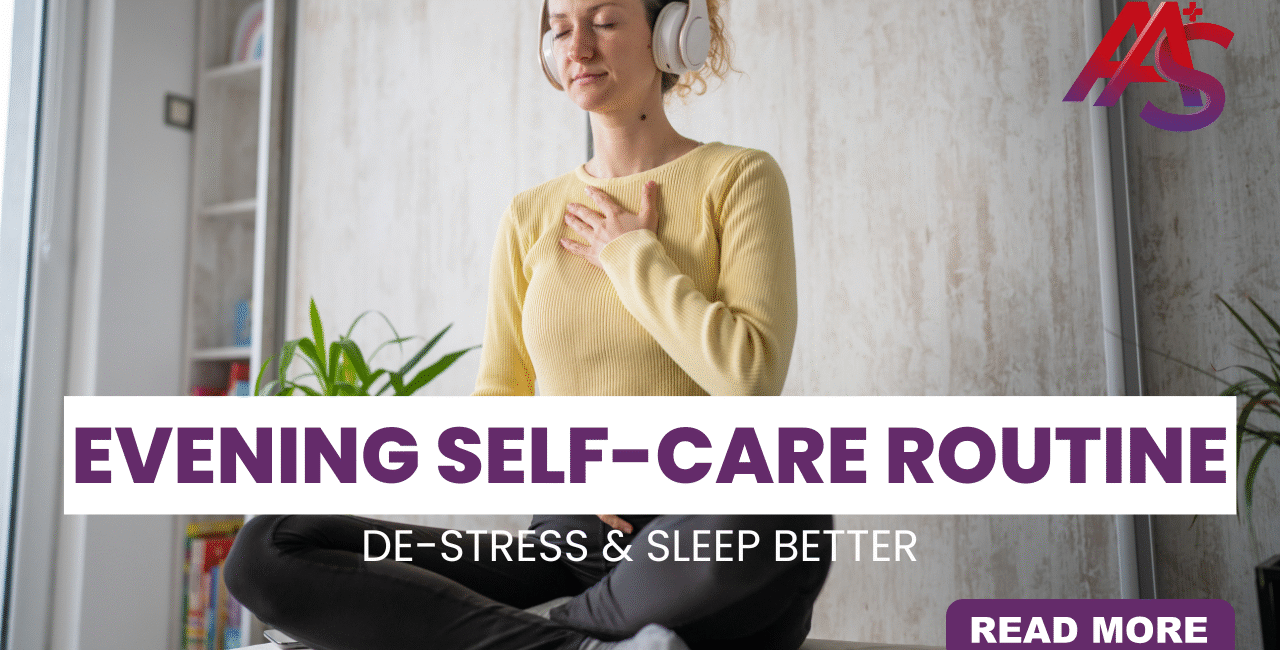An evening self-care routine is the single most effective way to unwind after a busy day, and therefore reduce stress, restore focus, and prepare your body and mind for restorative sleep. Moreover, this evening self-care routine will help you transition from “work mode” to “rest mode” in simple, repeatable steps. In this article you’ll find practical, evidence-backed tools, plus an easy-to-follow sample routine that you can adapt tonight.
Why an evening self-care routine matters — and how it helps
First, an evening self-care routine signals to your nervous system that the day is done; as a result, cortisol levels fall and melatonin is able to rise naturally. Additionally, good evening habits improve sleep quality, and consequently boost mood, immunity, and daytime focus. For these reasons, an intentional evening self-care routine is not indulgence — it is preventive care.
Moreover, research into sleep hygiene shows that consistent pre-sleep habits support falling asleep faster and sleeping more deeply (see Mayo Clinic for practical sleep hygiene tips).
In addition, global health guidance highlights mental-health routines as protective strategies against chronic stress and burnout (see WHO mental health guidance).
Core components
Clearly, an routine should be simple, repeatable, and tailored to you. Below are the core building blocks that most people find useful:
Wind-down window (30–90 minutes). First, switch screens to low stimulation; then dim lights and set intentions.
Movement + release. For example, gentle stretching, restorative yoga, or a short walk will lower tension.
Mindfulness practice. Next, use breathwork, progressive muscle relaxation, or a 5–10 minute guided meditation.
Gratitude or journaling. Afterward, write 2–3 quick things you’re grateful for or a short reflection to close the mental loop.
Sleep hygiene actions. Finally, keep your bedroom cool, dark, and screen-free to cue sleep (Mayo Clinic).
Because each component complements the others, consider combining two or three into a 20–40 minute ritual that you enjoy.
How to build your evening self-care habit: step-by-step
Below is a pragmatic plan that helps you design a personalized self-care habit. Follow these steps, and consequently you’ll build a habit that sticks.
1. Decide your wind-down start time.
For example, if you aim to sleep at 11:00 PM, start your evening self-care routine at 10:00 PM.
Additionally, set a gentle reminder rather than an alarm to reduce reactive stress.
2. Choose 3 core actions you will do every night.
For instance: light stretching → 8 minutes breathwork → 5 minutes journaling.
Moreover, keep the total time under 45 minutes initially to ensure consistency.
3. Remove friction.
Therefore, prep your sleep environment and lay out clothes or a yoga mat earlier.
Also, use an app that limits blue light if you must use screens briefly.
4. Track and adapt.
Next, note how you feel after a week and tweak timing, order, or techniques.
Finally, if one element doesn’t work, replace it rather than abandon the whole routine.
A quick, practical 20-minute routine (example)
If you want to start tonight, follow this short, tested flow:
0–3 minutes: Turn off bright screens, reduce lights, and set phone to Do Not Disturb.
3–8 minutes: Gentle neck and shoulder stretches; move slowly and breathe.
8–14 minutes: Box breathing or 4-4-4 breathing to slow the heart rate.
14–18 minutes: Gratitude journaling — write three sentences only.
18–20 minutes: Sip warm caffeine-free tea, and step into bed with a calm body and mind.
Because this is compact, it’s ideal for busy schedules and still yields measurable stress reduction.
Deepening your routine: mindfulness, movement and boundaries
If you have more time or want to deepen your practice, consider these additions:
Mindfulness: Furthermore, guided meditations (10–20 minutes) reduce rumination and therefore improve sleep onset.
Movement: Additionally, a 15-minute restorative yoga flow eases muscle tension and signals relaxation.
Digital boundaries: Instead, move social and work apps off your primary device or schedule an evening app block.
Sensory cues: For example, dim lights and a consistent scent (lavender) can become strong association cues for sleep.
Because these elements are cumulative, you’ll notice compounding benefits over weeks.
Common barriers and solutions
Many people try but stop soon after. However, you can overcome common hurdles with small adjustments:
“I’m too tired or busy.” Consequently, shorten the routine to 10–15 minutes and prioritize one high-impact habit.
“Screens pull me back in.” Therefore, create a charging station outside the bedroom to reduce temptation.
“I forget.” Instead, anchor the routine to an existing habit (habit stacking) such as brushing teeth.
“It feels awkward.” Moreover, once you repeat any routine for 21–30 days, it becomes automatic.
By tackling one barrier at a time, your evening self-care routine becomes a reliable part of daily life.
Measuring progress and keeping the habit
To ensure your self-care routine is working, try simple measures:
Subjective check: Rate your stress and sleep quality each morning on a scale of 1–5.
Objective tools: Use a sleep tracker or a simple sleep diary to identify trends.
Consistency goal: Aim for at least 5 nights per week for 4 weeks; then evaluate.
Because small wins build momentum, celebrate improvements and iterate slowly.
Learn more and continue the journey
If you want a broader framework that connects morning and evening habits, then read our detailed pillar on holistic wellness for practical continuity: the ultimate guide to building a holistic wellness routine. Similarly, if you’re curious about balancing morning and evening practices, take a look at our sub-page that focuses on morning rituals: morning rituals for wellness. Finally, to explore more resources from this site, visit Asgar Ali website for additional guides and updates.
For evidence and further reading on sleep hygiene and stress reduction, consult trusted health sources such as the Mayo Clinic (sleep hygiene tips) and the World Health Organization’s mental health resources (stress and mental-health protection). These sources provide practical, research-backed recommendations that complement an evening self-care routine.
Ready to start tonight?
If you’d like personalized recommendations to build an evening self-care routine that fits your schedule and goals, reach out to Asgar Ali — Group Head, Sales & Marketing at Artemis Hospitals, Gurugram for guidance and resources. Visit Asgar’s page to get started: Asgar Ali – Artemis Hospitals. Moreover, Asgar’s team can point you to practical programs and community workshops that help make healthy evening routines part of everyday life.
Final Thoughts
In short, an evening self-care routine is an accessible, low-cost way to reduce daily stress and improve sleep. Therefore, start small, stay consistent, and adapt the routine to your life. With time, these evening habits will transform your nights, and consequently, your days.
FAQs - Morning Rituals for Wellness
1. What is the best evening self-care routine for stress relief?
The best evening self-care routine for stress relief includes simple steps like stretching, deep breathing, journaling, and reducing screen time before bed. These habits lower cortisol levels, calm the mind, and prepare the body for quality sleep.
2. How can I start an evening self-care routine if I have a busy schedule?
If you’re busy, begin with just 10–15 minutes. For example, dim lights, practice 5 minutes of breathing exercises, and write 2 lines of gratitude. A short evening self-care routine can still lower stress and improve sleep without taking much time.
3. Can an evening self-care routine help with better sleep?
Yes, following an evening self-care routine supports natural melatonin production, reduces mental clutter, and improves sleep quality. Simple rituals like avoiding screens, journaling, and gentle stretching help you fall asleep faster and stay asleep longer.
4. What should I avoid during my evening self-care routine?
To make your evening self-care routine effective, avoid stimulants like caffeine, late-night heavy meals, and prolonged screen use. Blue light from phones or laptops disrupts melatonin production and can delay sleep.
5. How long should an evening self-care routine last?
An evening self-care routine can be as short as 15 minutes or as long as an hour. The key is consistency. Even a simple 20-minute routine with meditation, stretching, and journaling can significantly improve relaxation and sleep quality.
6. What are some quick evening self-care activities I can do daily?
Quick evening self-care activities include light yoga, mindful breathing, reading a calming book, listening to soothing music, or sipping caffeine-free herbal tea. These simple habits fit into daily life and promote mental relaxation.

